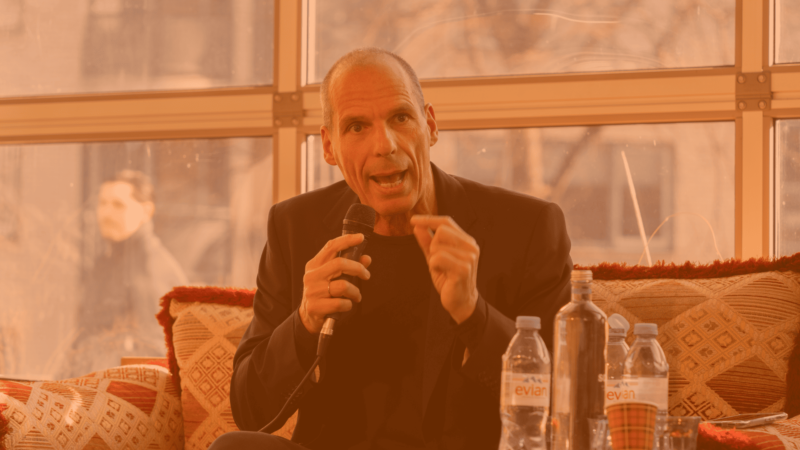… And it’s English, not British.
By Anthony Barnett
This article was originally published in openDemocracy.
As the UK government hands across its letter to the EU triggering Article 50, a poll was published showing that the judgment British voters made on 23 June last year has remained steady. There has been a very slight movement of opinion in support of leaving. Within the generations, the differences remain as striking as they were in the vote itself: there is no majority for leaving the EU amongst those under 55. Those between 55 and 64 favour Brexit by a mere 52%. It is the over 65’s who swing the outcome as they break 59% for Leave. In contrast, the under 25s are 55% for staying in the EU and only 32% for Leave. Brexit is government of the old, by the old, for the old – and it will perish with the old. Maturity could still mean that it is the right thing to do; only in Theresa May’s hands Brexit has become an attempt to restore a 17th century version of sovereignty that is bound to fail.
How long will this take, how long? The slow, drawn out process of modern aging can be interminable. Or fast. Incrementalism and sudden death exist side by side in the over 65s, so no clear prediction of when and how the nations of the United Kingdom will renew their engagement with the European Union is possible yet. Nor whether they will do so separately, jointly or in sequence. Nor how significant a change in the EU itself will be required, as it learns from its own crisis. Last week, the arch federalist Wolfgang Schäuble conceded in an interview with the Financial Times, “The federal idea has not gone away but at the moment it has no chance of being realised… there are no broad majorities to give additional shares of national sovereignty to Brussels… we have to improve… our intergovernmental methods”.
If that’s Schäuble’s view, what was the point of Britain leaving? The monster of neoliberalism and (as German finance minister) nemesis of Yanis Varoufakis is on his way out, while Varoufakis’s DiEM25 movement to reform Europe deepens its critique, proposing a European New Deal. There are therefore three ways of seeing the exchange of the British letter and the EU’s immediate response.
The one that will get the media limelight is the exchange itself, the terms they set, the actual argument over the next few months, the rows on both sides about the negotiation.
Much more important will be the two inner processes within the EU and the UK that will be unleashed: the internal reorganisation necessary to deliver the external objective of defining, achieving and selling the outcome over the next two years.
But by far the most important will be the EU’s. If all goes according to intentions, in about 18 months’ time an agreement will be concluded that each of the EU’s 27 member states must ratify. An intense period of reflection will then take place to define how the EU relates to its most important neighbour in each country’s legislature covered by its own domestic media. It is wrong to see Brexit as akin to a divorce between two single, separate beings. The EU is not a ‘super-state’. It shares but has not merged sovereignties. The nature and future of its “intergovernmental method” is now in play.
Europe and the gift of Brexit
A striking measure of the EU’s potential maturity (I emphasise potential) is that, just as it enters this defining period, the most ferocious advocate of centralisation relaxes his efforts. At the same time a feeble White Paper presenting “Reflections and Scenarios for 2015” was prepared for the leaders’ 60th anniversary summit by the EU Commission itself. It opens the way to doing less differently with a multispeed EU placed on the agenda. Ever closer centralisation is recognised as a has-been.
Until now, while each EU country has debated its own relationship with the Union in terms of its interests and desires, discussion about the nature and future of the EU itself and the actual ‘European project’, has been jealously guarded by the centre. The Commission and the growing Eurocracy that surrounds it has always sought to shield the project from the earthy localism of national legislatures and popular assent. There was one disastrous exception when the EU’s proposed constitution was put to referendums in 2005. The Spanish agreed, but French and Dutch emphatically did not. The leaders of the EU, with Tony Blair and the Brits actively amongst them, set about defying the popular verdicts. They created today’s Lisbon Treaty which delivered the constitution in all but name by anti-democratic means – turning the EU into an autonomous legal entity for the first time with its own diplomatic service and giving the European Court in Luxembourg hugely enhanced powers.
Since then, the EU has avoided entanglement with the domestic politics of the member states like the plague. Ireland was constitutionally bound to put Lisbon to a referendum and that took the embarrassment of two attempts. Now Brexit has vindicated its aversion. The terms of Brexit, however, will go to each member’s legislature to ratify. Nationally elected representatives will debate in their own parliaments what they think of the separation. In the process each country will have the opportunity to consider what it sees in the EU as a whole, and how it sees itself within a complex, probably multi-speed union. Done well, this could start to repair the democratic damage of Lisbon, by building a relationship between the EU and European citizens through their elected assemblies. A two year ‘legitimation process’ could be initiated, ironically enough, as the gift of Brexit.
Theresa May’s power grab
In the UK, however, a very different internal process is being demanded by the Westminster government. Not a democratisation, decentralisation and re-legitimisation of its political system now it has won back ‘independence’, but the opposite. The referendum was won with the cry of “take back control” and an aura of democracy hung about the slogan. The claim of a restoration of ‘sovereignty’ from Brussels carried with it a sense that the British people would enjoy self-government, once liberated from the oligarchy of the EU.
Instead of the much-needed democratisation of the British state following on from Brexit, the opposite is happening. The absolutism of the ‘absolute sovereignty of parliament’ that is coming to the fore. The most vivid, immediate demonstration has been north of the Scottish border. Here we can start to see what is going to happen to all British politics in the Brexit process.
The Scots voted 62% to 38% against Brexit in the referendum. A huge majority. They have a Scottish National Party government that was elected with a clear manifesto commitment that if the material circumstances of Scotland’s position in the world were altered it could hold an independence referendum – specifically designed as an option if the country were to be taken out of the EU against its will. But when the prime minister went to Glasgow on 3 March to address the Scottish Conservatives she made her priorities brutally clear.
Strengthening and sustaining the bonds that unite us is a personal priority for me… We must take this opportunity to bring our United Kingdom closer together… the fundamental unity of the British people which underwrites our whole existence as a United Kingdom… We need to build a new ‘collective responsibility’ across the United Kingdom, which unites all layers of government… I am determined to ensure that as we leave the EU, we do so as one United Kingdom… the UK Government serves the whole UK… That places on us a unique responsibility to preserve the integrity and future viability of the United Kingdom, which we will not shirk.
Instead of being intimidated by this bullying tone, Scotland’s First Minister, Nicola Sturgeon, declared that the UK government was being uncooperative. She demanded the authority to call a referendum between the Autumn of 2018 and the Spring of 2019, when the actual terms of Brexit become clear and are debated by parliaments across the EU.This has now become a formal request of the Scottish parliament.
The substantive issue behind Sturgeon’s stand is quite stark, although it has received almost no coverage in the London media who have no interest in understanding how things look from anywhere else. The EU is currently in charge of agricultural and fishing policies, two issues of great importance for Scotland. If these powers went to the Scottish parliament and government after Brexit, their responsibility would be increased considerably. This was the potential upside of Brexit for her, that Sturgeon expressed an interest in immediately after the referendum vote went against Remain. It would mean, however, that when London wants to negotiate new trade agreements with other countries round the world, it will need Scotland’s approval for any terms that cover trade in food and fish stocks. Instead of a ‘nimble’ UK government negotiating with the US, for example, on the import of their cheap, hormone-raddled steaks in return for exporting financial services, Edinburgh will object because of the need to protect its Angus herds. The prime minister has warned she is in no mood to permit this. In other words, what Theresa May calls “the fundamental unity of the British people which underwrites our whole existence as a United Kingdom”, could turn out to mean the authority to sell out Scotland in the name of her, “new ‘collective responsibility’”.
Gordon Brown was the UK’s last Labour prime minister and is a Scot. He attempted to intervene himself between Scotland’s First Minister and Westminster’s current prime minister by trying to upstage them both. In addition to agriculture and fisheries, Brown demanded that environmental regulation, the right to levy and adjust VAT and the £800 million that he calculates the EU spends in Scotland, should all be assigned to the Edinburgh parliament, to head off independence. Brown stated categorically,
The status quo has been overtaken by events because unless powers now with the European Union are repatriated from Brussels to the Scottish Parliament, the Welsh Assembly and the regions, Whitehall will have perpetrated one of the biggest power grabs by further centralising power.
But power grab is what Theresa May seems to have in mind. She was coldly dismissive of Sturgeon’s demand that the Holyrood parliament be given the right to call an independence referendum. To make her point she flew to Glasgow for a second time in a month and delivered another adamantine and even more extraordinary speech so revealing it needs quoting at length,
When this great union of nations – England, Scotland, Wales and Northern Ireland – sets its mind on something and works together with determination, we are an unstoppable force.
That is why the Plan for Britain I have set out… has as its heart one over-arching goal: to build a more united nation… fully respecting, and indeed strengthening, the devolution settlements. But never allowing our Union to become looser and weaker, or our people to drift apart.
So, as Britain leaves the European Union, and we forge a new role for ourselves in the world, the strength and stability of our Union will become even more important… for the good we can do together in the world, as a Global Britain… and as we face this great national moment together… the more united Britain that I am determined we should be once we emerge from this period of national change… And when we work together and set our sights on a task, we really are an unstoppable force.
There are three very striking aspects to this speech delivered in open combat with Sturgeon and the SNP. First, she will “never allow” that “our Union” becomes “looser and weaker”. Clearly, proposals for taking over the EU’s say over VAT is a loosening of the Union. She has set herself against Brown as well as Sturgeon. Should her intransigence provoke Brown into making an alliance with Sturgeon, Scotland will be free of England’s bullying.
Second, May’s language of “the nation”. She has given other speeches where she has referred to the nations of the UK and to then Britain itself as a nation. This time she has gone much further. Having acknowledged the separate national characters of the four countries of the UK she sets out as her “one over-arching goal” the building of a single, “more united nation”. She then emphasizes that Britain faces a “great national moment” and “a period of national change”. For her, Brexit is an exercise in nation building. May is seeking to fuse the countries of the UK into one nation. At the conclusion of her speech earlier in the month, she said: “We are four nations, but at heart we are one people”. Out of “one people”, one nation will emerge. So far as Scotland is concerned, this is an attempt to reverse the momentum of devolution altogether. It is not just a power grab, it turns the devolved administrations into a form of local government, denying them any distinct and separate national voice.
What kind of united nation will emerge from the fire of Theresa May’s Brexit? Her answer is “an unstoppable force”. She concludes her speech by repeating this to make sure we get the point. “together… we really are an unstoppable force”. Even Margaret Thatcher never claimed anything quite so balmy. Donald Trump does though. In his inauguration speech: “When America is united, America is totally unstoppable.” Such boasting is shameful enough when it comes from the most powerful politicians on the planet. From an unelected UK prime minister it is ridiculous. That May and her speech writers think it could inspire the Scots to join the English to lose themselves in a single British nation committed to global enterprise suggests the prime minister is already starting to lose her judgment under the pressures of Brexit.
I have laid out Theresa May’s claims on Scotland because the consequences of the direction she is taking seem so dire and it is important to base the stark conclusions on some careful evidence. We British are to regard ourselves as “one people”. Ein Volk. Those who stand in the way are… enemies of the people. What is going on here? Last October, after May’s first speech to her own party conference, I showed how she was mainstreaming the Daily Mail. If that is the origins of her politics, what is its destination? This too is now clear. She is seeking to restore the absolutism of the absolute sovereignty of parliament, using the referendum to legitimate not the sovereignty of parliament but executive supremacy over it.
There was a moment when, after the referendum, it might have been possible to use the democratic impulse within the Leave campaign that was directed against the unaccountable nature of Brussels. Use it here in Britain to inspire the decentralisation of power and create a popular democratic Britain. I am not saying it would have been easy, but the direction would have been future oriented. Building on the openness and audacity of the vote, Brexit might have been used to launch the decentralised constitutional democracy England especially needs. Instead, Theresa May has set her sights on restoring a mythical period – when the Queen was young and the country united around her. This is why Brexit is an old people’s home. It need not have been , but in Theresa May’s hands it is. I don’t mean that it is associated with aging as such, but with nostalgia for a specific form of the past. To achieve this regressive vision, Brexit is forcing her to centralise, to subordinate parliament to her will, and use the surveillance state she has helped to build to ensure the necessary discipline. By centralising rather than sharing, closing not opening the process, insisting on strict terms, she has brought all the strains of leaving the EU onto herself and her government. It isn’t fascism. Nor is it the imperialism that gave the English the space to recruit Scotland especially into a joint enterprise around the world. It is an attempt to regenerate the authoritarian powers locked in the UK’s pre-democratic absolutist system and give them a national form.
The nation she claims this to be is Britain – which is not a nation. Nor can it become one in her uninspiring hands. The reason lies at the heart of Brexit. There is a national passion but it is English. An English nationalism that expresses itself in a longing for Great British institutions. I show in the book I have been writing about Brexit and Trump, English nationalism is without its own home and its politicians need Britain as their base. Any Scot or Welshman or Irishman reading May’s speeches in Scotland hears a cold, commanding English voice, not a British one. The frustrated, democratic impulse behind Brexit’s call for control was English. Rather than use the opportunity to release the English nation from its imprisonment in a centralised Britain, May along with the Daily Mail & co demand the opposite. Their centralised Britain, were they to realise it, would once more deny the English the chance to find their own voice.
It won’t work. The appeal to a fused, single people is as unattractive south of the border as it is to the north, or the west with Northern Ireland and Wales. Everyone outside England witnesses what Nicolas Boyle describes as,
the willed triumph of illusion over reality revealed by the referendum result… most damagingly still at work in the determination of the English to cling on to their old exceptional status as anonymous masters of the United Kingdom and of the other nations with which they have to share the Atlantic Archipelago.
It won’t work even for the English for whom the United Kingdom was always a means to achieve wider influence. This, indeed, is why the old establishment joined the UK to the EU in the first place. They fully understand that sharing sovereignty threatened their form of domination at home, but regarded this as a price worth paying for influence within the EU and with the United States as part of the larger North Atlantic alliance. No such political prize is on offer from being an off-shore trading depot. In so far as the City of London might cash in to global freeloading, this will exacerbate all the regional and social inequities that led to the Brexit explosion. To cap this by making the “precious” Union with Scotland and Northern Ireland her main priority makes sense only for those who are psychically obsessed with the Union.
They are becoming fewer. The 2011 census found that “70.1 per cent of people residing in England associated themselves with an English identity”, while “English as a sole identity (not combined with other identities), was chosen by 32.4 million people (57.7 per cent)”. This shift is finding its way into the Conservative party itself, as the ground gives way below the Prime Minister’s strong words. Paul Goodman writing in the Irish Times reports that a survey of conservative party members undertaken by Conservative Home and the John Denham’s centre at Winchester University shows that “Only 33 per cent said it would inflict serious damage on the power, influence and well-being of the remaining parts of the UK” while 29% looked forward to it ending Scotland’s “unreasonable demands on England”. Previously, UK prime ministers never had the Union Jack in the Cabinet room in Downing Street. Such displays were for lesser countries striving to assert themselves. That May should feel the need to breach this deep symbol of superiority shows what a backward step is being undertaken by her authoritarian turn.
A final contrast illustrates the miserable turn of events. The conclusion to the EU’s White Paper is a low key, back of the document affair. Someone was clearly instructed to write a few paragraphs to wind it up. The tone is sad. One of them states,
Change in all things may be inevitable, but what we want from our lives and the European values that we hold dear remain the same. We want a society in which peace, freedom, tolerance and solidarity are placed above all else. We want to live in a democracy with a diversity of views and a critical, independent and free press. We want to be free to speak our mind and be sure that no individual or institution is above the law. We want a Union in which all citizens and all Member States are treated equally. We want to create a better life for our children than we had for ourselves.
This feels all the more authentic for not being pompously self-important. Most of it is standard rhetoric. One sentence stands out: “We want a Union in which all citizens and all Member States are treated equally”. The argument for Brexit was that the EU was stifling its member states in an old-fashioned, centralising fashion. Now we discover that it aspires to treat all of them equally, whereas in the United Kingdom such equality would be regarded, to quote the Prime Minister, as “drift” undermining the “precious union”. No equality of treatment here? I know all about the centralising and exploitative realities of the EU. But aspirations matter also. What Theresa May’s definition of Brexit aspires to is unsustainable.
Do you want to be informed of DiEM25's actions? Sign up here















